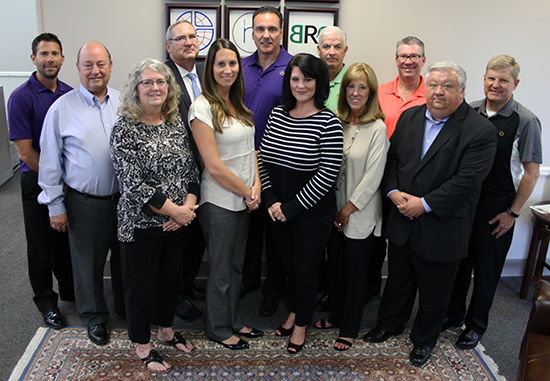
February-
March 2018
Stewardship
Lessons
------------------
|






The End Zone
By David Brown and Mike Wootton
Free Will Baptist Foundation partners with Cornerstone Estate Planning to offer end-of-life planning services to Free Will Baptists. David Brown, director of the Foundation, and Mike Wootton, president of Cornerstone, talk about the importance of making plans for the “end zone” of life.
David: It’s awfully easy for us Christians to put off making a comprehensive end-of-life plan, isn’t it, Mike?
Mike: It is, and sometimes it takes a catastrophe to jolt us awake. I’ll give you an example. On April 10, 2005, on her last day of spring break, our 17-year-old daughter was thrown from a friend’s boat at the lake. The boat’s propeller slashed through her body creating horrific injuries.
She was airlifted to Grady Hospital in Atlanta and rushed into surgery. My wife and I were in shock.
While she was in surgery, lawyers we didn’t even know showed up, wanting to take on Katie’s case. An attorney friend from our church rescued us, so to speak, and sent them away. He explained it was good Katie was 17, because if she had been 18, she would have been considered a legal adult, and we would have needed her prior written consent to make decisions about her care.
David: So, that was also a jolt.
Mike: It was, but it got worse. If either my wife or I had been the one injured or incapacitated, he said, the other could have had trouble because neither of us had advanced medical directives. At that point, a judge could have become involved. It scared me to think about the power the state can have in medical decision-making. When the emergency was over, my wife and I created a comprehensive estate plan that included medical directives.
David: At least one good thing came out of Katie’s horrible injuries.
Mike: Yes, and she’s fine now. She made a full recovery, though surgeons were unable to reattach her arm. She went on to graduate from college and is now happily married. We thank God for her every day. We came so close to losing her.
David: You have reminded me that when bad things happen, they can get worse without proper legal preparation.
Mike: That’s true. Planning is really important. Unfortunately, too many people think a will is enough, but that may not be the best plan. A will must be probated (verified) by a probate court before it can be enforced. And probate takes time, sometimes lots of it.
In addition, a will only goes into effect after death, so it provides no protection when incapacitated. In those cases, the court can, if it chooses, take control of your assets before you die.
David: Go back to probate for a minute, Mike. People should know more about that.
Mike: Probate is the legal process where the court pays your debts and distributes your assets to heirs after your death. Probate takes time—months, sometimes years. Plus, if you own property in other states, your family could face multiple probates. Many assets controlled by a will cannot be sold or distributed without court approval. Also, probate is a public process, so your family has no privacy. Anyone can see what you owned or who your creditors are, and wills can be contested. Probate also determines how much it will cost, how long it will take, and what information is made public.

Photo: Free Will Baptist Foundation and Cornerstone staff members.
David: You mentioned incapacitation. Why does the court get involved if someone is deemed incapacitated?
Mike: Christians need to remember a comprehensive estate plan is not just about the end of our lives. It’s also about the here and now. What if we can no longer conduct our own business due to mental or physical incapacities—accidents, Alzheimer’s, heart attack, or stroke for example? Only a court appointee can sign for you, even if you have a will. Once the court gets involved, it usually stays involved until you recover or die. In those cases, the court—not your family—oversees how your assets are used to care for you. And your family could endure the probate system again after your death.
David: Let’s say a person is thinking about an end-of-life plan. They have options—wills, powers of attorney, powers of appointment, advance directives, and beneficiary assignments—but a revocable living trust is the centerpiece of a good plan, isn’t it?
Mike: A revocable living trust is a legal document that, like a will, contains instructions for your assets when you die. Unlike a will, a properly written and funded revocable living trust avoids probate at death, controls your assets, and prevents the court from controlling your assets if you become incapacitated.
David: But do you lose control of the assets when you place them in the revocable living trust?
Mike: No, absolutely not! When you set up the trust, you transfer assets from your name into the name of your trust. But it all remains in your hands, though everything now belongs to the trust. You control the trust, so you keep control. The best part is you leave nothing for the courts to control when you die or become incapacitated.
David: In your opinion, who should make a comprehensive end-of-life plan with a revocable living trust?
Mike: Anyone who owns any titled assets and wants loved ones—spouse, children, or parents—to avoid court interference at death or incapacity should consider a revocable living trust. Age, marital status, and wealth really do not matter. You may also want to encourage other family members to do the same, so that you won’t have to deal with probate courts at their incapacity or death.
David: Planning ahead is taking care of what God has put in our hands, and that is part of our stewardship, isn’t it? It’s being a faithful servant-manager like those Jesus called blessed in his parables.
Mike: It is. That reminds me of a faithful couple named John and Mary from one of our churches. We helped plan their estate in 2013. John died two years later, and I went to help Mary and her daughter with the estate. As I went through their paperwork, I found everything in order except one deed, which had not been properly recorded. I quickly contacted a local attorney to take care of that. Had I not been there to help, the deed issue could have made the settling of the estate incredibly difficult. At Cornerstone, it’s our job to help people during their most difficult moments.
David: Your service is why the Foundation partners with you folks at Cornerstone. I was just thinking about the first time I met you at the 2012 national convention in Memphis. Remember? You had a booth about estate planning.
Mike: I remember people just kept walking by. I couldn’t get anybody interested. Terry Pierce, who had once been my pastor, stopped by to talk. During our conversation, I looked up and saw you coming, not that I knew you. You were just a tall man with an agitated, maybe even a little angry look. I wasn’t sure.
David: I guess I was. I remember asking you what you were doing.
Mike: That’s right. But within five minutes we had decided to get together and talk about how to partner in helping Free Will Baptists with estate planning.
David: Because of that partnership, now more than 1,500 Free Will Baptist families have an end-of-life plan in place. Plus, approximately $17 million dollars has been left to ministries across our denomination. I say amen to that!
Mike: Me, too…amen!
|
|

